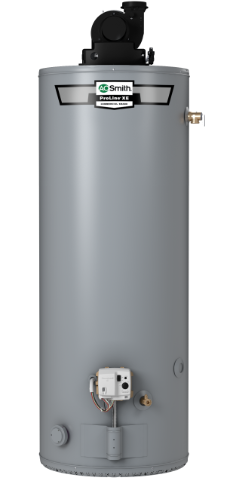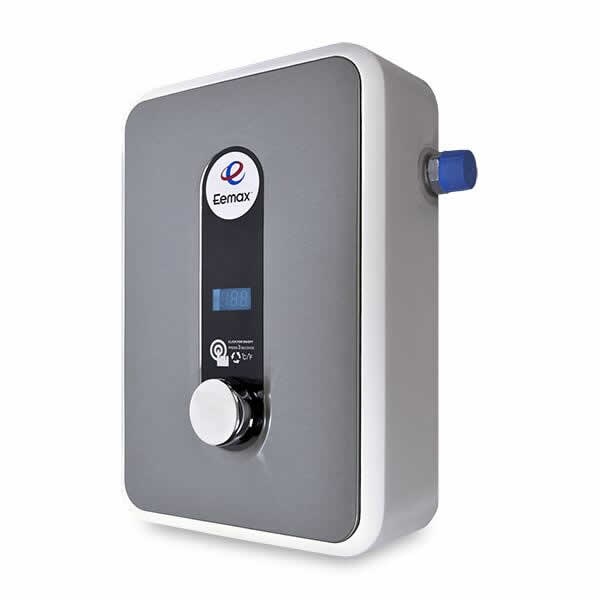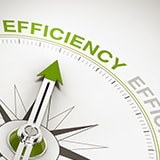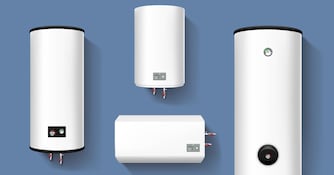
Tankless vs Tank Water Heaters
One of the biggest competitions in the plumbing world is that of tankless vs tank water heaters. Ultimately, your best water heating solution as a homeowner will depend on your application and personal priorities.
Below, we’ll compare tankless vs tank water heaters to help you decide which one wins out when it comes to your situation.
Navigation
Tankless Water Heater vs Tank Feature Comparison
| Tank Water Heaters (Gas or Electric) | Gas Tankless Water Heaters | Electric Tankless Water Heaters | |
|---|---|---|---|
 |  |  |  |
| Shop Tank | Shop Gas Tankless | Shop Electric Tankless | |
| Upfront Cost | $ | $$ | $$ |
| Installation Cost | $ | $$ | $$$ |
| Long-Term/ Energy Cost | $$$ | $ | $ |
| Hot Water Availability | Stored water in an emergency Hot water limited to what the tank can hold. | Hot water available on-demand for as long as needed No stored water in an emergency. | Hot water available on-demand for as long as needed No stored water in an emergency. |
| Space/ Aesthetics | Large tank Heavy | Small Wall-hung | Small Wall-hung |
| Maintenance | Requires regular descaling Parts not easily replaceable | Requires regular descaling Modular construction simplifies part replacement | Requires regular descaling Modular construction simplifies part replacement |
| Longevity | 6-12 Years | 10-15+ Years | 6-12 Years |
Tankless Water Heater vs. Tank Cost
We get it, money talks and the first thing you’re probably interested in is how much would a tankless water heater cost versus a storage tank unit.
Upfront Cost
When it comes to the upfront cost of the unit itself, you will typically save money with a conventional gas or electric storage tank unit, which is simpler in design and functionality.
Tankless water heaters are built with higher quality parts and more powerful burners in order to heat water on demand. These more expensive internal parts drive up the initial cost of going tankless.
Installation Costs
 All storage tank water heaters are typically less expensive than tankless water heaters when it comes to installation costs, especially if you are switching from tank to tankless.
All storage tank water heaters are typically less expensive than tankless water heaters when it comes to installation costs, especially if you are switching from tank to tankless.
Installing a gas tankless water heater often requires new venting and extra plumbing. Since storage tank models have their hot and cold water connections on top and tankless units have theirs on the bottom, switching requires adding pipe to reach the base of the tankless.
Switching to tankless may also require upsizing the natural gas line to adequately fuel the powerful burner.
There are some tankless models on the market, like the Noritz EZTR40, that have top-mount water connections and can make use of existing venting and, in some cases, the same gas line. Although these features do not eliminate the upfront and installation cost differences between a tank and tankless water heater, they narrow the gap.
It's a different story with electric tankless water heaters. Although they don't need a gas line, the electricity requirements often exceed what the typical house can handle, going as high as 150 amps.
Long-term/Energy Costs
 When it comes to water heaters, long-term costs refer to how much money it takes to fuel the units over their lifetime. In other words, how much are you paying in energy bills based on your water heater efficiency?
When it comes to water heaters, long-term costs refer to how much money it takes to fuel the units over their lifetime. In other words, how much are you paying in energy bills based on your water heater efficiency?
Tankless water heaters are more energy efficient than even high-efficiency storage tank water heaters. Although the highest efficiency storage tank units might be comparable to tankless units in the percentage of captured heat energy, that doesn’t tell the whole story.
A storage tank model’s stored water will naturally cool when it’s not being used. This causes the burner to fire periodically throughout the day to keep the water at the setpoint temperature even if no one needs heated water. It’s a mismatch between hot water supply and demand that wastes energy and money.
Tankless water heaters, on the other hand, fire up and heat water only when it is needed (i.e., someone turns on the shower). As a result, hot water supply and demand are matched up, and you save energy.
Over the course of many years, these savings add up. People who use a lot of hot water might find that the energy savings from tankless eventually pay for the additional upfront and installation costs.
That’s not always the case though, and some people will never recoup the extra cost. It all comes down to usage and energy costs in your area.
Tankless vs Traditional Water Heater Performance
Cost is important, but ultimately, you get a water heater for hot water. How do tank and tankless stack up when it comes to performance and comfort?
Hot Water Availability
 You want to be able to take a shower with a constant, consistent supply of heated water. The same goes for other warm water activities such as hand or dishwashing.
You want to be able to take a shower with a constant, consistent supply of heated water. The same goes for other warm water activities such as hand or dishwashing.
With a storage tank water heater, you always have a limited amount of hot water. If it runs out in the middle of your shower, get ready for a cold surprise. Granted, if you own a properly-sized storage tank, the chances of you running out of warm water are slim but still possible.
A tankless water heater heats water on demand, so you always have as much hot water as you need for as long as you want. You still need a properly-sized tankless unit to handle your maximum flow rate and temperature differential, but it’s not as if you can ever completely “run out” of hot water. Tankless units will typically reduce their flow rate before sacrificing heat.
One last important note: tankless water heaters only kick on if at least 0.5 gallons per minute of hot water is called for at the faucet. So you might not have hot water for brushing your teeth unless you open the valve almost all the way. It’s a downside, but it probably won’t be noticeable or critical for most people.
Space Savings/Aesthetics
 Water heater size might not matter to many people. After all, we usually place our water heaters in obscure corners of basements or garages—not exactly prime real estate.
Water heater size might not matter to many people. After all, we usually place our water heaters in obscure corners of basements or garages—not exactly prime real estate.
However, if someone has a finished basement or garage, then space and aesthetics can be important. If someone has a six-foot-tall, 60-gallon storage tank water heater, even if they don’t lose a lot of usable space, they have an unsightly mechanical device where a recliner could be.
Tankless water heaters are significantly smaller (no tank) and are wall-mounted, allowing them to fit compactly in virtually any space without becoming an eyesore. They’re not breathtakingly beautiful, but they’re a lot less noticeable.
Tankless vs Tank Water Heater Longevity
The last important question to ask is how do tank and tankless water heaters compare in terms of maintenance and longevity?
Maintenance
Both tank and tankless water heaters require periodic maintenance in the form of descaling to remove mineral deposits. The frequency of this maintenance will depend on water quality in your area and whether you use a water softener.
When it comes to parts and repairs, storage tank water heaters are typically a lost cause when they break and need to be replaced. Swapping out individual parts isn’t generally feasible.
On the other hand, tankless water heaters are usually built using modular construction, meaning each broken part can be individually replaced without having to replace the entire unit. Whether it ends up being financially worth it to replace an expensive heat exchanger versus the whole unit is a different matter.
Overall, maintenance is a toss-up between tank and tankless, with a slight advantage going to tankless due to its modular construction.
Longevity
The very last point to consider is the life expectancy of your water heater. Storage tank water heaters typically last 6-12 years if properly maintained. Tankless water heaters can last 10-15 years if properly maintained.
The advantage here is clear. A tankless water heater can potentially last twice as long as its storage tank counterpart. Under those circumstances, the higher upfront costs of tankless don’t matter because one unit could have the life of two storage tank units.
Who Wins?
Although the comparisons above seem to favor tankless water heaters as the winners of our clash, it will ultimately come down to your application.
There are instances where storage tank water heaters, despite their shortcomings, are the better option. As mentioned, some people will not realize enormous energy savings from tankless due to water usage or local utility costs. For them, it might make sense to go with the less-expensive upfront option, especially if they're patient enough to wait their turn for hot water or have a small family that won't use much.
Ultimately, speak with your plumber to figure out the best option. He or she will have insight into whether tank or tankless will win the "clash" in your home.
Water Heater Buyer's Guide Navigation
Home | Tank Water Heaters | Tankless Water Heaters | Point-of-Use Water Heaters | Indirect Water Heaters





